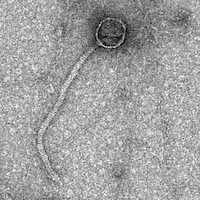Mycobacterium phage Pita107
Add or modify phage thumbnail images to appear at the top of this page.
Know something about this phage that we don't? Modify its data.
| Detailed Information for Phage Pita107 | |
| Discovery Information | |
| Isolation Host | Mycobacterium smegmatis mc²155 |
| Found By | Kennedy and Madison |
| Year Found | 2016 |
| Location Found | spokane , WA USA |
| Finding Institution | Gonzaga University |
| Program | Science Education Alliance-Phage Hunters Advancing Genomics and Evolutionary Science |
| From enriched soil sample? | No |
| Isolation Temperature | Not entered |
| GPS Coordinates | 47.665556 N, 117.401111 W Map |
| Discovery Notes | We found this phage on the shore of lake Arthur from a water sample. |
| Naming Notes | Pita or pitta (/ˈpitə/ or US /ˈpiːtə/)[1] also known as Arabic Bread or Lebanese Bread or Syrian Bread,[2][3][4] is a soft, slightly leavened flatbread baked from wheat flour that originated in the Near East,[4][5] most probably Mesopotamia around 2500 BC.[6] It is used in many Mediterranean, Balkan and Middle Eastern cuisines and resembles other slightly leavened flatbreads such as Iranian nan-e barbari, South Asian flatbreads, Central Asian naan, and pizza crust. Etymology[edit] The first known mention of the word in English was in 1936.[7] The English word is borrowed from Modern Greek πίτα. These all probably come from the Byzantine Greek πίτα 'bread, cake, pie, pitta' (attested in 1108).[7] Some sources trace it to the Ancient Greek πίττα or πίσσα 'pitch/resin',[8][9] while others characterize this as "unlikely" and trace it to Latin picta 'painted', itself supposedly from Greek πηκτή 'congealed'.[10][11] Though the Modern Hebrew word pittāh is spelled like the Aramaic pittəṭā/pittā (which is related to Levantine Arabic fatteh), they are not connected historically.[7] Other hypotheses trace it to Germanic[12] or Illyrian.[13] The word has been borrowed by Turkish as pide,[14] and appears in the Balkan languages as Serbo-Croatian pita, Romanian pită, Albanian pite, Bulgarian pitka or pita. In Arabic, the phrase "خبز البيتا" (pita bread) is sometimes used; other names are simply "خبز" 'bread' or "الخبز العربي" 'Arab bread' or "خبز الكماج" 'ekamj bread'. source: Wikipedia |
| Sequencing Information | |
| Sequencing Complete? | No |
| Genome length (bp) | Unknown |
| Character of genome ends | Unknown |
| Fasta file available? | No |
| Characterization | |
| Cluster | K |
| Subcluster | -- |
| Cluster Life Cycle | Temperate |
| Annotating Institution | Unknown or unassigned |
| Annotation Status | Not sequenced |
| Plaque Notes | small. circular, slightly cloudy, 2mm in diameter |
| Morphotype | Siphoviridae |
| Has been Phamerated? | No |
| Publication Info | |
| Uploaded to GenBank? | No |
| GenBank Accession | None yet |
| Refseq Number | None yet |
| Archiving Info | |
| Archiving status | Archived |
| Pitt Freezer Box# | 41 |
| Pitt Freezer Box Grid# | D7 |
| Available Files | |
| EM Picture | Download |
